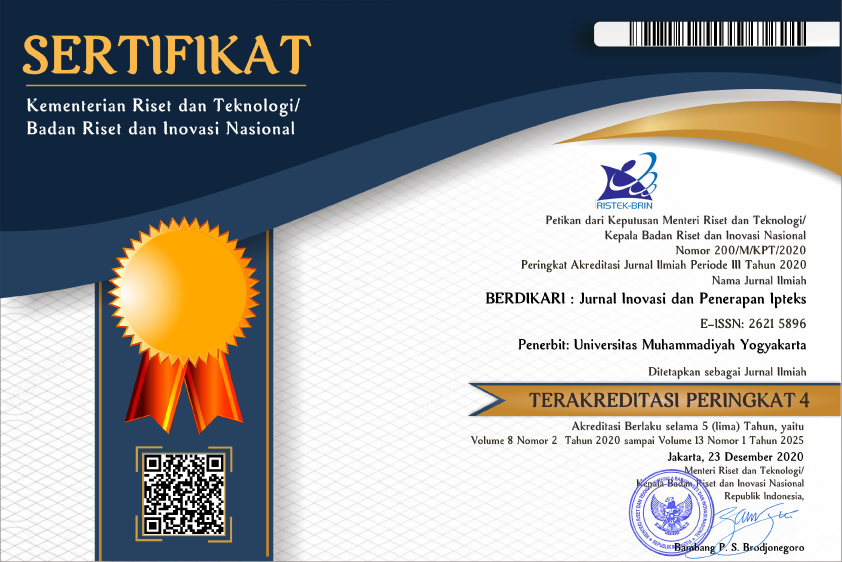Pengelolaan Sampah Bernilai Ekonomi Berbasis Masyarakat
DOI:
https://doi.org/10.18196/bdr.8285Keywords:
independent, economic value, management, behaviour, wasteAbstract
Waste can cause environment problem in many aspects if it is not handled properly. On the other hand, waste can give safe and comfort feelings if it is well managed. Besides, the right waste management can be a product that has economic and social values. It can be done through social empowerment program. The program is aimed at changing the perspective and knowledge of the people about waste, so that waste can be managed properly and has economic value. Meanwhile, the program target is the people in Sungsang Village, Banyuasin, Sumatera Selatan. The program is carried out in various ways, namely socialization, training, practice, processing accompaniment, and waste management. The result of the empowerment conducted showed that there was a change in the perspective, knowledge, and social behaviour towards waste. The interest of the people to manage waste independently has grown well. They got the feeling of safe and comfort, and the economic benefit with proper and wise waste management, both the inorganic and organic waste. The program is hoped to be sustainable so that waste problems can be minimized disseminated to the people in Sungsang Village, Banyuasin, Sumatera Selatan.
References
Mita Novianty. (2013). Dampak Program Sampah terhadap Sosial Ekonomi Masyarakat di Kelurahan Binjai, Kecamatan Medan Denai Kota Medan. Fakultas Ilmu Sosial dan Ilmu Politik USU Medan Departemen Ilmu Kesejahteraan Sosial, Medan.
Nyoman, Wardi. (2011). Pengelolaan Sampah Berbasis Sosial Budaya Upaya Mengatasi Masalah Lingkungan di Bali. Jurnal Bumi Lestari, Vol. 11, No. 1.
Pertiwi Andarani dan Naohiro Goto. (2014). Potential E-waste Generated from Households in Indonesia Using Material Flow Analysis. SPinger Japan, No.16:306-320.
Purnaha, H. dan Yuriandala Yebi. (2010). Studi Pemanfaatan Sampah Plastik Menjadi Produk dan Jasa Kreatif. Jurnal Sains dan Teknologi Lingkungan, Vol. 2, No. 1 p. 21-31.
Riswan, dkk. (2011). Pengelolaan Sampah Rumah Tangga di Kecamatan Daha Selatan. Jurnal Ilmu Lingkungan, Vol. 9, No. 12011.
Undang-Undang No. 18 Tahun 2012.
Yuni Puspitasari dan Mardwi Rahdriawan. (2012). Kajian Pengelolaan Sampah Berbasis Masyarakat dengan Konsep 3R (Reduce, Reuse, Recycle) di Larangan, Kota Cirebon. Planologi UNDIP, Vol. 8(4), p:349-359.
Downloads
Published
Issue
Section
License
Copyright
Authors retain copyright and grant BERDIKARI Jurnal Inovasi dan Penerapan IPTEK the right of first publication with the work simultaneously licensed under an Attribution 4.0 International (CC BY 4.0) that allows others to remix, adapt and build upon the work with an acknowledgment of the work's authorship and of the initial publication in BERDIKARI Jurnal Inovasi dan Penerapan IPTEK.
Authors are permitted to copy and redistribute the journal's published version of the work (e.g., post it to an institutional repository or publish it in a book), with an acknowledgment of its initial publication in BERDIKARI Jurnal Inovasi dan Penerapan IPTEK
License
Articles published in the BERDIKARI Jurnal Inovasi dan Penerapan IPTEK) are licensed under an Attribution 4.0 International (CC BY 4.0) license. You are free to:
- Share — copy and redistribute the material in any medium or format.
- Adapt — remix, transform, and build upon the material for any purpose, even commercially.
This license is acceptable for Free Cultural Works. The licensor cannot revoke these freedoms as long as you follow the license terms. Under the following terms:
- Attribution — You must give appropriate credit, provide a link to the license, and indicate if changes were made. You may do so in any reasonable manner, but not in any way that suggests the licensor endorses you or your use.
- No additional restrictions — You may not apply legal terms or technological measures that legally restrict others from doing anything the license permits.




